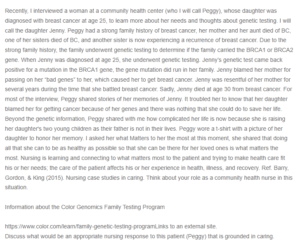Nursing Responses to Individual Patients
It is important to provide Peggy with a caring and supportive response. Caring in nursing consists of empathy, compassion, and a holistic approach to patient care (Su et al., 2020). I would start by offering my heartfelt condolences for the death of Jenny. Recognizing and validating Peggy’s sorrow and emotions is essential in establishing trust and rapport. I would sit with Peggy, allowing her to share her memories and feelings about Jenny. Furthermore, I would demonstrate my willingness to listen to and understand her. Next, I would address Peggy’s feelings of guilt for passing on the BRCA1 gene mutation to Jenny. I would reassure her that Jenny’s diagnosis cannot be solely based on genetics (Lee et al., 2019). I would teach her about the multifactorial nature of breast cancer. I would highlight that genetics is just one factor. Additionally, there are many other factors that contribute to the development of the disease. Do you need help with your assignment ? Feel free to contact us. Our team is ready to help.
I would also address Peggy’s concerns about her health and its bearing on her ability to care for her grandchildren. I would involve her in open discussions to get a good understanding of her fears and worries. I would teach her about resources and support systems, such as information on regular screenings, healthy lifestyle choices, and available support groups, to help her prioritize her health and well-being. For her current situation, I would evaluate her social support system. I would also link her with community resources that can provide practical assistance–for instance, childcare services or support groups for grandparents raising grandchildren. This would help ease some of her challenges and enable her to continue caring for her loved ones. Finally, I would honor Jenny’s memory and acknowledge Peggy’s grief. I would recognize the importance of the T-shirt she wears. This simple act of recognition would demonstrate my understanding and respect for Peggy’s loss. It will foster a healing relationship based on sympathy and compassion.
References
Lee, A., Mavaddat, N., Wilcox, A. N., Cunningham, A. P., Carver, T., Hartley, S., & Antoniou, A. C. (2019). BOADICEA: a comprehensive breast cancer risk prediction model incorporating genetic and nongenetic risk factors. Genetics in Medicine, 21(8), 1708-1718. https://doi.org/10.1038/s41436-018-0406-9
Su, J. J., Masika, G. M., Paguio, J. T., & Redding, S. R. (2020). Defining compassionate nursing care. Nursing ethics, 27(2), 480-493. https://doi.org/10.1177/0969733019851546
ORDER A PLAGIARISM-FREE PAPER HERE
We’ll write everything from scratch
Question

Nursing Responses To Individual Patients
Recently, I interviewed a woman at a community health center (who I will call Peggy), whose daughter was diagnosed with breast cancer at age 25, to learn more about her needs and thoughts about genetic testing. I will call the daughter Jenny. Peggy had a strong family history of breast cancer, her mother and her aunt died of BC, one of her sisters died of BC, and another sister is now experiencing a recurrence of breast cancer. Due to the strong family history, the family underwent genetic testing to determine if the family carried the BRCA1 or BRCA2 gene. When Jenny was diagnosed at age 25, she underwent genetic testing. Jenny’s genetic test came back positive for a mutation in the BRCA1 gene, the gene mutation did run in her family. Jenny blamed her mother for passing on her “bad genes” to her, which caused her to get breast cancer. Jenny was resentful of her mother for several years during the time that she battled breast cancer. Sadly, Jenny died at age 30 from breast cancer. For most of the interview, Peggy shared stories of her memories of Jenny. It troubled her to know that her daughter blamed her for getting cancer because of her genes and there was nothing that she could do to save her life. Beyond the genetic information, Peggy shared with me how complicated her life is now because she is raising her daughter’s two young children as their father is not in their lives. Peggy wore a t-shirt with a picture of her daughter to honor her memory. I asked her what Matters to her the most at this moment, she shared that doing all that she can to be as healthy as possible so that she can be there for her loved ones is what matters the most. Nursing is learning and connecting to what matters most to the patient and trying to make health care fit his or her needs; the care of the patient affects his or her experience in health, illness, and recovery. Ref. Barry, Gordon, & King (2015). Nursing case studies in caring. Think about your role as a community health nurse in this situation.
Information about the Color Genomics Family Testing Program
https://www.color.com/learn/family-genetic-testing-programLinks to an external site.
Discuss what would be an appropriate nursing response to this patient (Peggy) that is grounded in caring.

